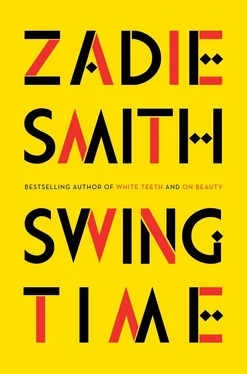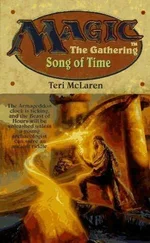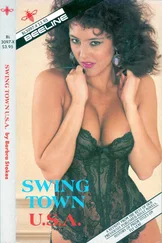My mother tried to help, in her way. Look closer at that Cotton Club, she said, there is the Harlem Renaissance. Look: here are Langston Hughes and Paul Robeson. Look closer at Gone with the Wind : here is the NAACP. But at the time my mother’s political and literary ideas did not interest me as much as arms and legs, as rhythm and song, as the red silk of Mammy’s underskirt or the unhinged pitch of Prissy’s voice. The kind of information I was looking for, which I felt I needed to shore myself up, I dug out instead from an old, stolen library book— The History of Dance . I read about steps passed down over centuries, through generations. A different kind of history from my mother’s, the kind that is barely written down — that is felt. And it seemed very important, at the time, that Tracey should feel it too, all that I was feeling, and at the same moment that I felt it, even if it no longer interested her. I ran all the way to her house, burst into her room and said, you know when you jump down into the splits (she was the only girl in Miss Isabel’s dance class who could do this), you know how you jump into a split and you said your dad can do it, too, and you got it from your dad, and he got it from Michael Jackson, and Jackson got it from Prince and maybe James Brown, well, they all got it from the Nicholas Brothers, the Nicholas Brothers are the originals, they’re the very first, and so even if you don’t know it or say you don’t care, you’re still dancing like them, you’re still getting it from them. She was smoking one of her mother’s cigarettes out of her bedroom window. She looked much older than me doing that, more like forty-five than eleven, she could even blow smoke out of those flaring nostrils, and as I spoke aloud this supposedly momentous thing I had come to tell her I felt the words turning to ash in my mouth. I didn’t even know what I was saying or what I meant by it, really. To stop the smoke from filling the room, she kept her back to me, but when I had finished making my point, if that’s what it was, she turned to me and said, very coolly, as if we were perfect strangers, “Don’t you ever talk about my father again.”
Five
“This isn’t working.”
It was only about a month after I’d started working for her — for Aimee — and as soon as it was said aloud I saw she was right, it wasn’t working, and the problem lay with me. I was young and inexperienced, and didn’t seem able to find my way back to that impression I’d had, on the very first day we’d met, that she might be a human woman like any other. Instead my gut reaction had been overlaid by the reactions of others — ex-colleagues, old schoolfriends, my own parents — and each had their effect, every gasp or incredulous laugh, so that now each morning when I arrived at Aimee’s house in Knightsbridge or her Chelsea offices I had to battle a very powerful sense of the surreal. What was I doing here? I often stuttered as I spoke, or forgot basic facts she’d told me. I would lose the thread of conversations during conference calls, too distracted by another voice inside me that never stopped saying: she’s not real, none of this is real, it’s all your childish fantasy. It was a surprise at the end of a day to close the heavy black door of her Georgian townhouse and find myself not in a dream city after all but in London and only a few steps from the Piccadilly Line. I sat down next to all the other commuters as they read their city paper, often picking one up myself, but with the sense of having traveled further: not just from the center back to the suburbs but from another world back into theirs, the world that seemed to me, aged twenty-two, to exist at the center of the center — the one they were all so busy reading about.
“It’s not working because you’re not comfortable,” Aimee informed me, from a big, gray couch that sat opposite an identical couch on which I sat. “You need to be comfortable in yourself to work for me. You’re not.”
I closed the notebook in my lap, lowered my head and felt almost relieved: so I could go back to my real job — if they’d still have me — and reality. But instead of firing me, Aimee threw a cushion playfully at my head: “Well, what can we do about that?”
I tried to laugh and admitted I didn’t know. She tilted her head toward the window. On her face I saw that look of constant dissatisfaction, of impatience, which later I would get used to, the ebb and flow of her restlessness became the shape of my working day. But in those early days it was all still new to me, and I interpreted it only as boredom, specifically boredom and disappointment with me, and not knowing what to do about it, looked from vase to vase around that huge room — she packed every space with flowers — and at the further beauty outside, at the sun glinting off the slate-gray roofs of Knightsbridge, and tried to think of something interesting to say. I didn’t understand yet that the beauty was part of the boredom. The walls were hung with many dark Victorian oils, portraits of the gentry in front of their grand houses, but there was nothing from her own century, and nothing recognizably Australian, nothing personal. This was meant to be Aimee’s London home and yet it didn’t have a thing to do with her. The furniture was of plush, generalized good taste, like any upscale European hotel. The only real clue that Aimee lived here at all was a bronze near the windowsill, about as big as a plate and the same shape as one, at the center of which you could see the petals and leaves of something that at first seemed to be a lily on its pad but was actually the full cast of a vagina: vulva, labia, clitoris — the works. I didn’t dare ask whose.
“But where do you feel the most comfortable?” she asked, turning back to me. I saw a new idea painted on her face like fresh lipstick.
“You mean a place?”
“In this city. A place.”
“I’ve never thought about it.”
She stood up: “Well, think about it and let’s go there.”
The Heath was the first place that came to mind. But Aimee’s London, like those little maps you pick up at the airport, was a city centered around St. James’s, bordered to the north by Regent’s Park, stretching as far as Kensington to the west — with occasional forays into the wilds of Ladbroke Grove — and only as far east as the Barbican. She knew no more of what might lie at the southern end of Hungerford Bridge than at the end of a rainbow.
“It’s a big sort of park,” I explained. “Near where I grew up.”
“OK! Well, let’s go there.”
We cycled through town, winding round buses and racing the occasional courier, three of us in a line: her security detail first — his name was Granger — then Aimee, then me. The idea of Aimee cycling through London infuriated Judy but Aimee loved to do it, she called it her freedom in the city, and maybe at one traffic light in twenty the adjacent driver would lean forward on the wheel, put down his window, having noticed something familiar about the blue-gray, feline eyes, that dainty triangular chin… But by that point the lights would change and we’d be gone. When she rode she was in urban camouflage anyway — black sports bra, black vest and a grungy pair of black cycling shorts, worn at the crotch — and only Granger seemed likely to catch anybody’s attention: a six-foot-four, two-hundred-and-fifty-pound black man wobbling on a titanium-framed racer, stopping every now and then to take an A‒Z out of his pocket and furiously study it. He was from Harlem, originally—“where we got a grid”—and the inability of Londoners to likewise number their streets was something he couldn’t forgive, he’d written off the whole city on account of it. For him, London was a sprawl of bad food and bad weather in which his one task — to keep Aimee safe — was made more difficult than it needed to be. At Swiss Cottage he waved us on to a traffic island and peeled his bomber jacket off to reveal a pair of massive biceps.
Читать дальше












